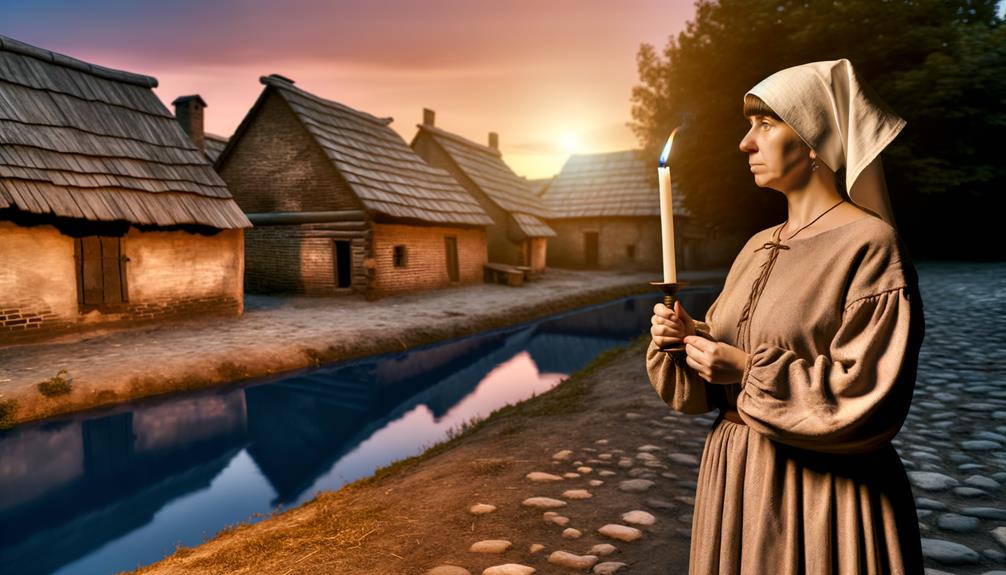Meaning of the Name Joan
The name Joan, originating from the Hebrew Yohanan and meaning 'God is gracious,' has traversed a fascinating linguistic path through Greek (Ioannes) and Latin (Johannes) forms before settling into its English variant. Historically, it is linked to significant figures such as Joan of Arc, adding layers of cultural and religious importance.
The name exhibits regional variations like Juana in Spanish and Jeanne in French, reflecting its deep-rooted cultural resonance. Its popularity saw a peak in the early 20th century, influenced by notable namesakes.
Joan symbolizes qualities such as resilience, virtue, and strength. Discover more about its enduring legacy.

Key Takeaways
- Joan originates from the Hebrew name Yohanan, meaning 'God is gracious.'
- The name evolved through Greek 'Ioannes,' Latin 'Johannes,' and Old French 'Jehanne.'
- Joan symbolizes resilience, virtue, and strength.
- The name is historically significant due to figures like Joan of Arc and Joan Baez.
- Joan has various cultural forms, such as Juana, Jeanne, and Giovanna.
Origin and Etymology
The name Joan originates from the Hebrew name Yohanan, meaning 'God is gracious,' and has been adapted through various languages, including Greek and Latin, before becoming Joan in English.
Etymologically, Yohanan evolved into the Greek 'Ioannes,' which was subsequently Latinized to 'Johannes.' The Old French form 'Jehanne' later influenced the English adoption of the name as Joan.
This linguistic journey reflects the name's deep cultural and religious significance, moving across different regions and eras. The name's transformation illustrates the fluid nature of language and how nomenclature can shift while retaining core meanings.
Joan, consequently, carries a rich etymological history, embodying a legacy that spans centuries and diverse linguistic landscapes, making it a name of considerable depth and resonance.
Historical Significance
Joan's rich etymological history is complemented by its profound historical significance, as the name has been borne by notable figures who have shaped cultural, religious, and political landscapes across centuries. This influence is particularly evident in the lives of several prominent women:
- Joan of Arc: A national heroine of France, whose leadership during the Hundred Years' War and subsequent martyrdom cemented her legacy in European history.
- Joan I of Navarre: Her reign in the late 13th and early 14th centuries had significant political ramifications, influencing the territorial disputes between France and Navarre.
- Joan Baez: A pivotal figure in the 20th-century American folk music revival, whose activism and music have impacted social movements globally.
These Joans exemplify the name's enduring legacy.
Cultural Variations
The name Joan exhibits significant regional variations, with each culture imparting its unique influence on its pronunciation and spelling.
Historical factors, including linguistic shifts and migrations, have played pivotal roles in shaping these variations.
For example, the name appears as Juana in Spanish-speaking regions and as Jeanne in French contexts, reflecting the interplay of local languages and historical events.
Regional Name Variations
Across various cultures, the name Joan manifests in different forms and adaptations, reflecting regional linguistic and historical influences. This diversity underscores the name's widespread appeal and adaptability.
The following examples illustrate regional variations:
- Spain: In Spanish-speaking countries, the name Joan is often rendered as Juana for females and Juan for males, showcasing its gender-specific adaptations.
- France: The French equivalent is Jeanne, famously borne by Jeanne d'Arc, highlighting its deep cultural resonance.
- Italy: In Italian, the name appears as Giovanni for males and Giovanna for females, demonstrating the influence of Latin roots.
These variations not only highlight linguistic differences but also the cultural significance embedded in naming conventions across regions. Each form of Joan carries unique phonetic and historical nuances.
Historical Influences
Examining the historical influences on the name Joan reveals how cultural shifts and pivotal historical events have shaped its varied adaptations and enduring popularity across different regions. In medieval France, Joan of Arc's heroism cemented the name's association with bravery and piety, significantly impacting its adoption in Europe.
The name Joan also gained prominence in England, where it became a staple due to its biblical resonance relating to John the Apostle. Variations like Johanna in Germany and Juana in Spain emerged, reflecting linguistic adaptations and local traditions.
The 20th century saw renewed interest in the name, driven by notable figures such as Joan Crawford and Joan Baez, illustrating its capacity to transcend time and geography while maintaining cultural relevance.
Famous Namesakes
The name Joan is distinguished by its notable bearers across various fields. Historical figures such as Joan of Arc have left an indelible mark, while literary characters named Joan have enriched narratives with their complexity.
Additionally, Joans in the entertainment industry have achieved significant acclaim, further cementing the name's cultural resonance.
Historical Figures Named Joan
Joan of Arc, a national heroine of France and a Catholic saint, stands as one of the most renowned historical figures bearing the name Joan. Her contributions to French history during the Hundred Years' War are unparalleled.
Beyond Joan of Arc, other notable figures include:
- Joan I of Navarre: Queen regnant of Navarre from 1274 to 1305, she played an essential role in the political landscape of medieval Europe.
- Joan II of Naples: Queen of Naples from 1414 to 1435, her reign was marked by political unrest and significant alliances.
- Joan Beauchamp Probert: Known for her role in the English Wars of the Roses, she was a significant political figure in 15th-century England.
Each Joan has left a distinct legacy.
Joan in Literature
Literature has immortalized several Joans, each contributing uniquely to the narrative landscape across different genres and eras.
In Shakespeare's 'Henry VI, Part 1,' Joan la Pucelle, a representation of Joan of Arc, is depicted as a complex character, both heroic and contentious.
Similarly, in Mark Twain's 'Personal Recollections of Joan of Arc,' Twain reimagines Joan as a figure of purity and unwavering faith, painting a more sympathetic portrayal.
Joan Didion, a renowned American essayist, has also left an indelible mark with her introspective and incisive prose, exploring themes of personal and societal disintegration.
These literary Joans, spanning from historical dramatizations to modern introspection, illustrate the versatility and enduring significance of the name in enriching literary heritage.
Joan in Entertainment
In the world of entertainment, numerous illustrious figures named Joan have left a profound impact, shaping the cultural landscape through their diverse talents and contributions. These personalities have excelled in various domains, from acting to music, leaving indelible marks on their respective fields.
- Joan Crawford – An iconic actress of Hollywood's Golden Age, Crawford's powerful performances and enduring screen presence earned her an Academy Award for Best Actress.
- Joan Baez – A seminal figure in folk music, Baez's distinctive voice and activism have influenced generations of musicians and social movements.
- Joan Rivers – Pioneering female comedian and television host, Rivers broke barriers with her sharp wit and candid humor, paving the way for future comedians.
These Joans exemplify excellence and innovation in entertainment.
Popularity Over Time
Over the decades, the popularity of the name Joan has experienced significant fluctuations, influenced by cultural, social, and historical factors.
In the early 20th century, Joan saw a surge in popularity, driven by notable figures such as Joan of Arc and actresses like Joan Crawford. The name peaked in the 1930s and 1940s, reflecting its prominence in popular culture and media.
However, the following decades witnessed a gradual decline, correlating with evolving naming trends and a shift towards more contemporary names. This ebb and flow highlight the dynamic nature of name popularity, often reflecting broader societal changes.
Understanding these patterns provides valuable insight into the cultural contexts that shape naming conventions over time.
Modern-Day Usage
Although the name Joan is not as prevalent in contemporary naming trends as it once was, it continues to maintain a degree of usage, particularly among those who appreciate its historical and cultural significance.
Modern-day usage of Joan can be categorized into several key areas:
- Literary and Media References: Joan remains a popular choice for characters in literature, film, and television, often symbolizing strength and resilience.
- Family Lineage: Many families choose to name their children Joan to honor relatives, preserving the name's legacy across generations.
- Cultural and Religious Significance: In regions with strong Catholic traditions, Joan is favored due to its association with Joan of Arc, a revered historical figure.
These factors contribute to Joan's enduring presence in modern society.
Symbolism and Traits
The name Joan embodies qualities of strength, resilience, and virtue, often symbolizing an unwavering spirit and moral fortitude. Historically linked to figures such as Joan of Arc, the name conveys a sense of bravery and steadfastness in the face of adversity.
Analytical studies of the name suggest individuals named Joan often exhibit leadership qualities, a strong sense of justice, and a nurturing disposition. Traits such as determination, integrity, and compassion are frequently associated with this name, reflecting a balanced blend of emotional and intellectual capabilities.
The name Joan also carries a subtle spiritual connotation, implying a deep connection to faith and ethical principles. This rich tapestry of attributes makes Joan a name resonant with profound character and enduring legacy. In addition to its spiritual connotation, the meaning of the name Joan is often associated with strength and courage, as symbolized by historical figures such as Joan of Arc. This further emphasizes the name’s timeless significance and its association with individuals who embody unwavering conviction and moral fortitude. Overall, the meaning of the name Joan reflects a powerful blend of spirituality, integrity, and resilience.
Conclusion
The name Joan, originating from the Hebrew name Yochanan meaning 'God is gracious,' has undergone various cultural adaptations and maintained its presence through historical figures such as Joan of Arc.
Remarkably, it reached peak popularity in the United States during the 1930s, ranking within the top 10 names for girls.
Presently, it signifies traits of strength and resilience. This enduring appeal highlights the name's adaptability and timeless relevance in diverse cultural contexts.






